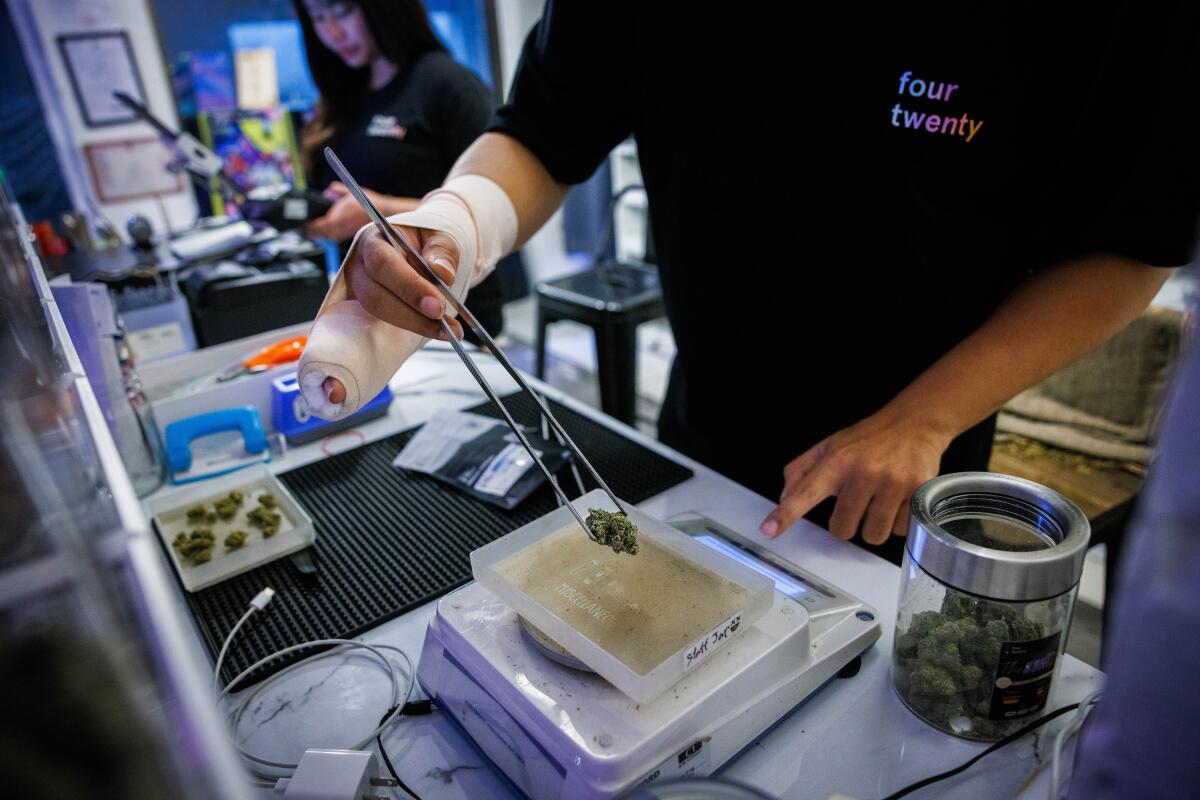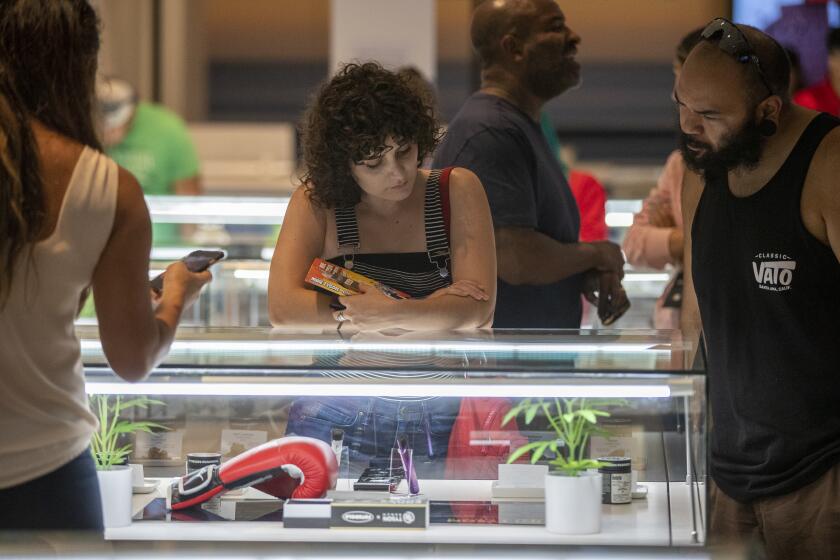
Two years ago, soon after Thailand became the first Asian nation to decriminalize cannabis, Sarunyu Toprasert and three friends joined a rush of pot entrepreneurs and launched the Channel Weed Store.
They opened their third location last month, pouring $27,000 into the operation and bedecking the storefront with a neon light in the shape of a marijuana leaf and a poster advertising prices as low as $4 a gram.
Days later, the country’s prime minister announced that the government was reversing course and would ban recreational marijuana by the end of the year.
“It was a shock,” said Sarunyu, 33. “There were rumors of this happening before, but this time they sounded serious.”

As in California, legalization here hasn’t worked out as planned. Promises of economic salvation for poor farmers have not materialized. There are growing concerns that marijuana is harming children and making the already chaotic roads even more dangerous.
And a growing worry about methamphetamine — which remains illegal — has made drugs in general an appealing target for politicians. In parliamentary elections last year, most political parties campaigned against the recreational use of pot.
Small operators across California’s legal cannabis market say government taxes, fees and regulations are threatening their survival.
“Drugs are a problem that destroys the future of the country,” Prime Minister Srettha Thavisin said last month. “Many young people are addicted. We have to work fast.”
He said medical use will be allowed to continue, but details have been sparse, leaving Sarunyu to wonder whether his business has any future.
Behind the counter, which displayed packets of watermelon-flavored weed gummies claiming to be the “world’s strongest,” his friends rolled joints to be sold individually.
“It is all uncertain at this point,” he said. “But it is better to do the best that we can now rather than regret it later.”
::
Marijuana wasn’t always so controversial in Thailand.
The plant’s use in traditional food and medicine dates back centuries. And just a couple of generations ago, farmers in the rural northeast used cannabis to relax after a long day in the fields.
But in 1979, the Thai government caved to U.S. pressure to crack down and passed a comprehensive narcotics act that imposed harsh penalties for smoking, possessing or selling the plant.
A highly publicized war on drugs — which included extrajudicial killings of suspected dealers — followed in the early 2000s. Methamphetamine was the primary target, but the crackdown also deepened the stigma against cannabis.

When the country legalized marijuana for medical use in 2018, cultivation was closely supervised by the government while standards for prescriptions were strict.
Not that there was much concern about wider use — polls suggested there was little demand for recreational weed.
Driving the push for broader legalization were concerns about overcrowding in the country’s prisons, where more than 70% of inmates are held on drug charges. The plan’s architect, Anutin Charnvirakul, who was health minister at the time, also touted exporting cannabis and hemp products as a way to help Thailand’s pandemic-stricken economy and its poor farmers.
In June, Thailand became the only country in Asia to legalize marijuana, igniting a green rush that has seduced farmers, corporations and others.
In June 2022, the government removed marijuana from its list of banned narcotics, and with minimal regulation, the pot industry immediately took off in a way that few anticipated.
More than a million Thais have registered to grow cannabis at home, while more than 12,000 cannabis dispensaries across the country are operating on three-year licenses from the Department of Thai Traditional and Alternative Medicines.
The industry is now projected to be worth around $1.2 billion by the end of 2025, according to the University of the Thai Chamber of Commerce.
1

2

3

4

1. Staffers at the Four Twenty farm harvest cannabis in Bangkok. (Lauren DeCicca / For The Times) 2. A staff member at the Four Twenty dispensary prepares cannabis for a customer in Bangkok. 3. Cannabis from the Four Twenty farm. 4. Big, a staff member at the Four Twenty cannabis dispensary, prepares different cannabis strains for sale in Bangkok.
On Khaosan Road, Bangkok’s landmark backpacker haunt, cannabis sales now make up as much as 20% of all revenue, according to Sanga Ruangwattanakul, a dispensary owner and president of the local business association. Customers are often from places where pot is illegal.
“A lot of people from South Korea, Singapore, Hong Kong,” he said. “They come here and want to smoke openly.”
He said that his dispensary brings in $16,000 to $19,000 a month and that he keeps at least 60% of that — in large part because the government does not tax pot sales.
By comparison, the typical profit margin for dispensaries in California is 15%.
As the industry grew, the demand for workers has driven up salaries.
“Almost everyone in cannabis pays above average,” said Tai Taveepanichpan, the owner of the franchise Four Twenty, which employs more than 80 people at seven separate companies, including a cannabis cultivation consultancy and a hydroponics equipment supplier.
1

2

3

1. Pre-rolled joints are sold at the Four Twenty cannabis dispensary in Bangkok. 2. Bongs are sold at the Four Twenty cannabis dispensary. 3. Different cannabis strains are readied for sale at a dispensary in Bangkok.
At his indoor cannabis farm in Bangkok last month, workers in white jumpsuits were busy trimming his harvest of White Runtz, a strain developed in Los Angeles. Hunched over trays of the buds, which smelled faintly like cheese, they worked their tiny scissors in silent concentration.
It’s a skill in high demand these days, and his employees make $800 a month, about 36% more than the average national pay. But even that isn’t enough to stop competitors from poaching them.
Tai marveled at what his country had created in such a short time: “This is the most fair and open cannabis market there is in the world right now by far.”
::
It wasn’t long before the pot boom started to raise concerns about public health.
In the first year of legalization, a quarter of adults reported using cannabis, up from 2.3% in 2019, according to surveys by Chulalongkorn University’s Center for Addiction Studies.
The rise has alarmed some doctors, who argue that cannabis can lower children’s IQs and increase car accidents, suicides and mental health episodes.
“It is undeniable that cannabis poses health risks, both mentally and physically, especially for young people and pregnant women,” the Royal College of Physicians of Thailand said in a June statement.
The government has been collecting reports of cannabis-related incidents from hospitals, and there was a marked increase after decriminalization, according to Anunchai Assawamakin, a pharmacologist at Mahidol University and an advisor to the Office of the Narcotics Control Board, one of Thailand’s drug agencies.
There were 20,804 cannabis-linked psychosis cases in the 12 months after the change, up from 10,619 in the 12 months leading up to it.
But Anunchai cautioned that more study is needed.

“Even at this stage, the effects of cannabis legalization are not fully understood,” he said. “We also have a meth problem that is difficult to separate from cannabis since users often take them together.”
In recent years, methamphetamine has been entering the country in record quantities from Myanmar, where political instability has allowed drug cartels to ramp up production. More than 150,000 people were treated for methamphetamine abuse last year, up from about 90,000 in 2022, according to the government.
In October 2022, a 34-year-old former police officer who had been fired for possession of meth stormed a day-care center in Nong Bua Lamphu province and fatally shot or stabbed 36 people — most of them children.
The killings had a profound effect on attitudes about drugs. For many Thais — and the media here — the distinctions among various narcotics are lost.
“The news will say cannabis caused someone to attack an elderly man, but then it turns out that person was using other substances as well,” said Sarunyu, the dispensary owner. “This kind of sensational news coverage has been constant.”

In such a climate, politicians are under pressure to appear tough on drugs. And at a time when several other policy failures have put the prime minister on the defensive, the cannabis controversy represents an opportunity to score easy political points, given that it was his Pheu Thai Party that was behind the war on drugs 20 years ago.
“Pheu Thai won a lot of votes on their anti-drug policy in the last 20 years,” said Atthachai Homhuan, an attorney specializing in cannabis cases. “So if this policy of reclassifying cannabis as an illegal narcotic fails, there will be no more votes for the prime minister next semester.”
More than 75% of Thais currently back the plan to reclassify cannabis as a narcotic, according to one recent poll. Among the plan’s supporters is Narong Promjitta, a 55-year-old beer vendor at a marketplace in the southern island of Phuket.
Like many Thais his age, he dislikes the smell of pot smoke and the mass intrusion of dispensaries along the beaches. He fears the effect this will have on the students who hang out at the market after school.
“I am worried about laws for other drugs like meth being relaxed,” he said. “We don’t need weed tourism. Phuket can grow its economy in other ways.”
::
In California, the marijuana industry has been beset by illegal operations, worker abuses and a failure to live up to its economic promise — issues widely attributed to heavy taxation and poor enforcement of regulations. In Thailand, there are almost no regulations to enforce.
The proponents of legalization here never intended to create a market that was so freewheeling.
Illegal cannabis farms are engulfing parts of California and exploiting farmworkers who labor in squalid, deadly conditions, a Times investigation finds.
Back in early 2022, before removing cannabis from the illegal narcotics list, the then-ruling Bhumjaithai Party proposed a bill known as the Cannabis and Hemp Act that would have confined recreational use to select tourist areas and required dispensaries to have traditional medicine doctors on their premises.
But the bill ran aground in the National Assembly.
“We prepared everything, but there was internal maneuvering to prevent the cannabis side from succeeding,” said Anunchai, who worked on the legislation.
The government pushed ahead with decriminalization anyway, allowing the weed industry to grow in what Anunchai describes as “a vacuum that has dragged on for over two years.”

Other than a handful of provisional measures, such as those against selling cannabis to people younger than 20 or smoking in public, regulations and enforcement are scant. Many vendors openly sell joints from illegal street stalls. There are no rules that prevent licensed dispensaries from opening near schools.
Noah Levit-Ades, a former commercial grower from Los Angeles who moved to Bangkok in the winter to oversee the country’s first hospital-run cannabis farm, said he has been alarmed by the lack of oversight in the recreational market.
Because his crop will be used to manufacture pain or end-of-life care medicines for immunocompromised cancer patients in Thailand and abroad, the indoor facility is certified under the European Union’s accreditation scheme for manufacturing and agricultural standards.
But accreditation is voluntary for cultivators supplying dispensaries. And given the absence of a central tracking system for Thailand’s commercial cannabis inventory, there is no way for authorities to recall products tainted with heavy metals, pesticides or other contaminants.

Describing his experience at the dispensaries lining Sukhumvit Road, a tourist zone known for its strip clubs and massage parlors, Levit-Ades said: “Ninety-eight percent of these shops I’ve been to, all the weed has mold. You pop it open and there it is.”
As for the farmers who grow it, the economics haven’t worked in their favor.
In the early days, 2 pounds of dried cannabis buds could fetch about $11,000. Now cultivators can barely get $1,000 for some varieties.
Making matters worse, Thailand is now being flooded with weed illegally imported from California, where the market is also facing a glut.
Years after California legalized cannabis with Proposition 64, some supporters say it has not met expectations, while those who opposed the initiative say it has proved worse than they feared.
One weed smuggler in Phuket, a Thai national who asked not to be named, estimated that up to 70% of the region’s dispensaries are selling imported cannabis, the majority of it low-quality overflow that was either illegally grown or failed testing in California. He said it is flown in by Thai or American “backpackers” and sold to local dispensaries at cut-rate prices.
“I bring in about 100 kilograms a month,” he said. “It’s very low risk. Once we had a whole plane working for us.”
Many Thai cultivators, facing bankruptcy, are turning to exports of their own, sending pot to countries where it is illegal.
1

2

3

1. A view of the outdoor growing area at the Artemis 98 cannabis farm in Chiang Mai, Thailand. 2. The cannabis harvested from the Artemis 98 farm. 3. A view of the outdoor growing area at the farm.
“It’s now really, really difficult to move cannabis because of the prices,” said one grower in the northern province of Chiang Mai who spoke on condition of anonymity because he was afraid of retaliation from his business partners.
Like many other farms in the area, he regularly offloads much of his inventory to a local wholesaler at heavily discounted rates.
“They process it into brick weed and ship it to Malaysia, Laos, Korea, Taiwan,” he said. “A lot of growers use dispensaries as a storefront to showcase their products. But their sales are actually coming from wholesale.”
::
Given the problems and the politics, even the former health minister who led the drive to decriminalize pot has grudgingly pledged his support for undoing that decision.
“We can’t take a personal attitude towards this,” Anutin, who has since joined the current government as interior minister, recently told local media.
But making cannabis illegal again is unlikely to go down easily.

The more than a million people who registered their growing activities might wake up one morning as potential criminals. Many of the 3,000 marijuana offenders who were released from prison just two years ago could suddenly find themselves back behind bars. The illegal market would probably bounce back bigger than ever.
Cultivators and dispensary owners have said that they would sue the government for damages.
“Some people have used their entire savings to invest in the business,” said Rattapon Sanrak, a weed activist and the founder of Thailand’s first legal dispensary in 2022. “There are at least 60,000 jobs at stake. Imagine if those people lost their jobs immediately.”
Prasitchai Nunual, head of the advocacy group Writing Thailand’s Cannabis Future, said the solution is the Cannabis and Hemp Act — which remains stuck in the National Assembly.
California has largely ignored the immigrant workers who harvest America’s weed. Their exploitation is one of the most overlooked narratives of the era of legal cannabis.
A proper regulatory framework, he said, could include measures to assuage public concerns, such as stricter zoning to keep dispensaries away from children, as well as a better commercial licensing system to stabilize the market and protect small businesses.
“Everyone agrees that it needs to be controlled,” he said. “But government agencies lack the data to make informed decisions regarding cannabis regulation.”
If that means taxes on his sales, Sarunyu, the dispensary owner, is happy to pay.
“But the government needs to show us how it benefits the public,” he said. “For example, the tax revenue from alcohol funds public television.”

Seated across from a shelf filled with shiny new bongs was his only customer, a bespectacled, middle-aged man.
After a brief consultation at the counter, he decided to roll his own rather than buying one of the ready-made joints on offer. The loose cannabis grounds proved to be unwieldy, defying his attempts to corral it with the paper, spilling out in every direction.
He succeeded after several minutes, anointing the joint with a quick stroke of the tongue before lighting up and taking two quick puffs. He flashed a satisfied smile.
He had never tried marijuana before. But after hearing about the impending ban, he had wanted to smoke his first joint while it was still legal.
Special correspondents Poypiti Amatatham in Bangkok and Nattha Thepbamrung in Phuket contributed to this report.
More to Read
Start your day right
Sign up for Essential California for news, features and recommendations from the L.A. Times and beyond in your inbox six days a week.
You may occasionally receive promotional content from the Los Angeles Times.












